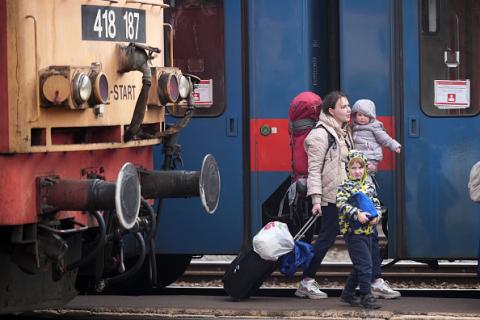European Economic
and Social Committee
By Zsolt Kükedi, EESC member, Hungary
As a delegate from an environmental organisation, I know there is very little room to discuss environmental issues in my country at the moment. People are busy facing the human tragedy and the huge influx of Ukrainian refugees, and appreciate even the smallest sign of interest and compassion and any help one can offer.
Because of my regional development work, I know a lot of local mayors and county leaders who immediately and selflessly offered their community houses and common areas to refugees after the war began. There was a settlement of barely 700 people that took in more than one hundred Ukranians. It has been giving them food ever since, keeping a roof over their heads and washing their clothes. Immediately after the outbreak of the war, when I returned home from the EESC plenary session, I wrote to 18 local government members, mayors and county leaders in eastern Hungary asking what was happening to them and what we might be able to help them with from faraway Budapest. I did not plan on rushing to the border myself, as in the early days enthusiastic volunteers can be more of a hindrance than a help in humanitarian work.
Nine of the 18 people I contacted responded. The others presumably didn’t have time to read or reply to emails, which is completely understandable in this situation. Those who responded, however, said that my letter was reassuring to them. Just the fact that we were thinking of them and knowing that they could turn to us was very good to hear. Someone asked for money because they needed blankets and detergents. Someone redirected me to where donations were requested. But overall, they promised to get in touch if the situation stabilised and they could no longer bear it financially or personally.
We also took part in another form of help: collecting medical supplies and delivering them to those in need who were unable to obtain them in this situation. We delivered stoma bags from my wife’s workplace. Stoma bags are special containers for people who are unable to excrete their bodily waste naturally due to a defect or disease affecting some parts of the digestive or urinary tract. Bodily waste is excreted through an opening, or stoma, in a specific location in the abdominal wall. Patients need a new bag every day. Transporting these vital bags was something we had not expected to do. However, our lives are complex enough to understand that in a situation like this, we also have to make unusual donations.
In our section meetings at the EESC we discussed the Ukrainian-Russian war and its impact. I was asked to call a speaker from the battlefield and a nuclear expert to understand the threat surrounding Ukrainian nuclear power stations. As I have a lot of personal acquaintances in Ukraine due to my development work, I managed to connect with Serhii Prokopenko, a young man from Kharkiv, an innovation and entrepreneurship specialist, consultant and economic researcher. He reported straight from the battlefield, from a bunker in Kharkiv where he had been sheltering following the bombing of the area shortly before our meeting. He alternated with the Hungarian nuclear expert who came after him as the internet connection stalled. Dr Zsolt Hetesi, senior research fellow at the National University of Public Administration, has been involved in environmental, energy and sustainability research since 2005. Previously, as one of the leaders of the Research Group on Sustainable Development and Resources, he had talked a lot about the crisis resulting from overpopulation and over-consumption of resources. As an expert on resource depletion, he talked about the situation, vulnerability and chances of a potential nuclear disaster at any of the four nuclear power plants in Ukraine. He tried to reassure the audience that for the time being the world did not seem to be in immediate danger from these nuclear power plants. This presentation was followed by Serhii, and as he spoke we could feel the reality of war. He received a big round of applause. The section sympathised sincerely with his account, and we were unable to focus on business as usual.
I feel that this is also a humanitarian task: to connect with the people who are isolated by the war and to throw away our apparent sense of security so that the wind of reality can reach us and we feel that there is something we can do too, even from afar.
